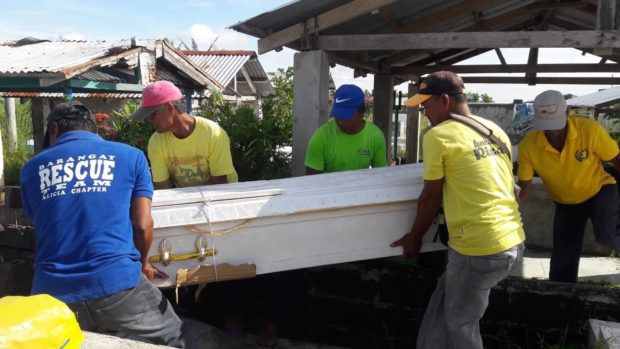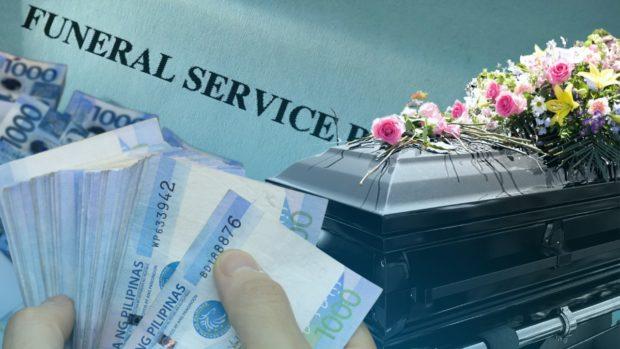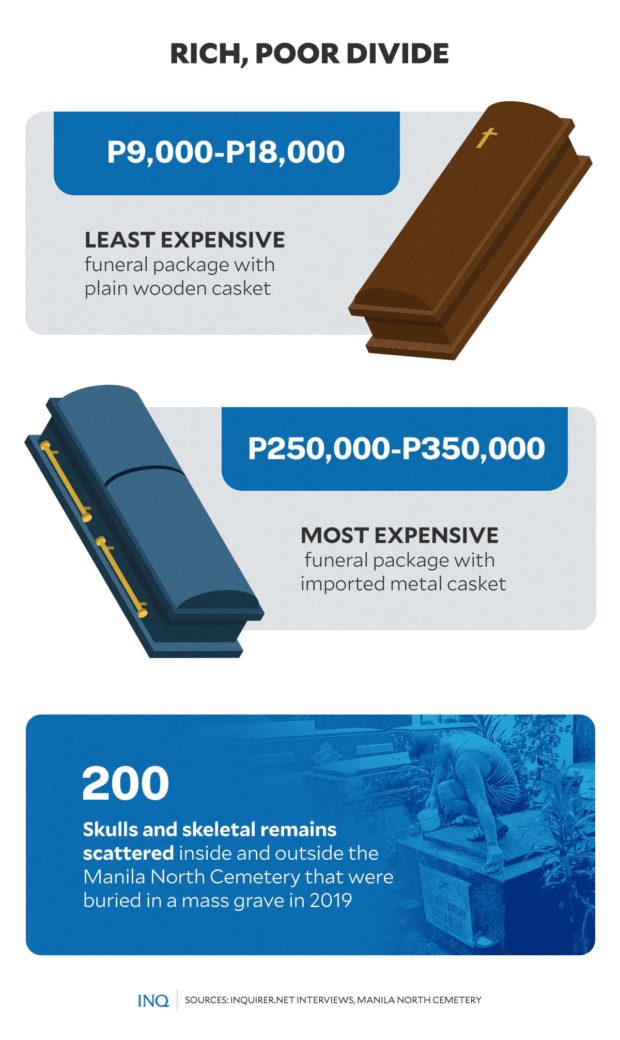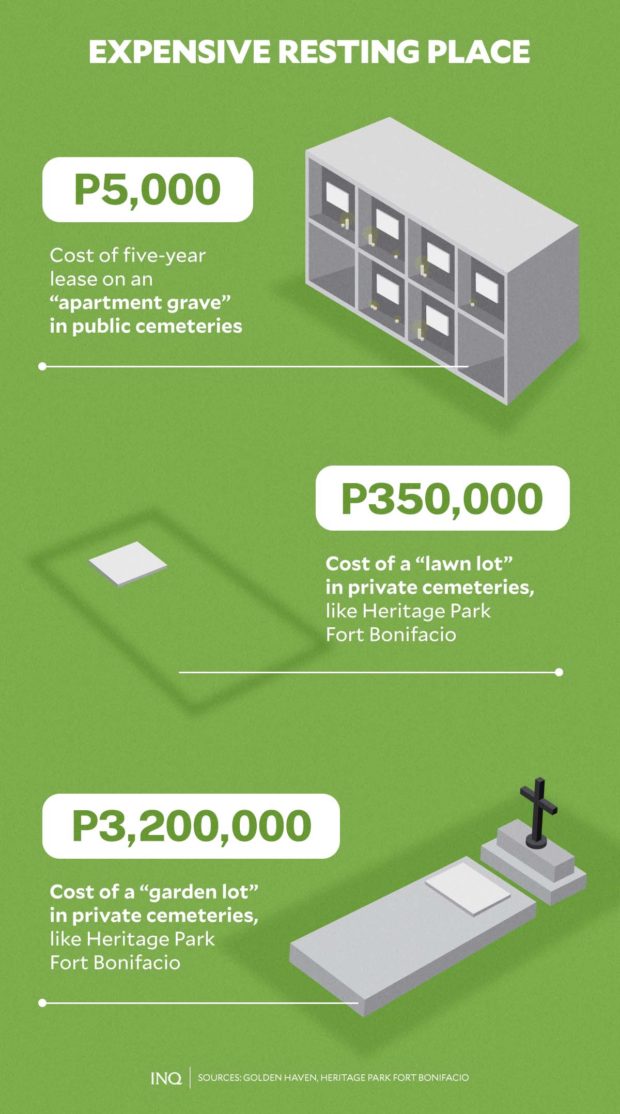Dying poor: Endless emotional, financial agony for families
MANILA, Philippines—Heartbreaking, death always comes with sorrow, but for people who have less in life, dying also means leaving the bereaved behind with a heavy financial burden.
Even in death, the rich and poor divide is so glaring that while the rich can give their departed the best funeral service, the poor have no choice but to settle for what their insufficient funds can afford. As they say “kahit sa kamatayan, mahirap pa rin (still poor even in death).”
Take the case of Avelino Galvan, who died in 2019.
One of his relatives told INQUIRER.net that the entire family was poor so they decided to get the cheapest funeral package, which was worth P9,000 then. It included a plain wooden casket and a wreath made of crepe paper.
But since Galvan’s home, where his wake was held, was reached by water that spilled over from the river because of intense rain, his coffin was damaged which his relatives fixed with packaging tape, cardboard and a cord.
Article continues after this advertisement
DEATH OF A POOR. Barangay watchmen carry the casket of Avelino Galvan with extreme care after it was damaged by floodwaters. PHOTO COURTESY OF JOSELYN RAMOS
“Kung may kakayahan lang kami, bakit naman ‘di namin pipiliin ‘yung mas maayos, ‘di ba? Kaya lang ay walang wala talaga kami, mahirap pa sa mahirap,” his son, Edgar Galvan, said.
Article continues after this advertisement(If we have the means, why won’t we choose the better one, right? The problem is we really have nothing in life, we are so poor.)
INQUIRER.net talked to some funeral service providers, like the St. Sebastian Funeral Home in San Narciso, Zambales, which revealed that better caskets, which come with elegant designs, were worth P250,000 to P350,000.
The cheapest service that it can provide is worth P18,000. It includes a plain wooden coffin and a set of fresh flowers, way better than what P9,000 can get.
Death while drowning in poverty
While the funeral service that was worth P9,000 was already tough for Galvan’s relatives, it was tougher for the loved ones that Joel Cacayan Jr., who died in 2020, left behind.
Tin Graganta, his sister, recalled that Cacayan died at the height of the COVID-19 crisis: “Walang wala talaga kami noon kasi ako, may sariling pamilya na rin. ‘Yung nanay ko naman na magsasaka, hirap din.”
(We really had nothing then. I already have my own family that I am also providing for, then my mother, who is a farmer, was struggling, too.)
She told INQUIRER.net that if not for the help of some relatives and close friends, they would not have been able to afford the expenses for the wake and burial of his brother, who had a disability since birth.
According to the website of the Department of Social Welfare and Development, the government provides burial assistance to individuals or families needing immediate help. Here are the requirements:
- Funeral contract
- Registered death certificate
- Barangay certificate of economic status and any valid ID of the client
- Permit to transfer and health permit (for transfer of remains)
- Referral letter (if applicable)
According to the website of the Overseas Workers Welfare Administration, Filipinos who avail themselves of that assistance program can receive up to P10,000, which can be used to cover expenses.
During her tenure, former Vice President Leni Robredo had extended P1.23 billion worth of medical and burial assistance to 92,375 poor Filipinos as of the last quarter of 2021.
The Office of the Vice President (OVP), which is now led by Vice President Sara Duterte, is also giving out medical and burial assistance. Last September, the OVP had already processed P90,740,950 for over 3,000 applicants.
Leased resting place
But despite the assistance that the government can give, some Filipinos still find it hard to cope with the expenses of giving their dead a dignified burial, especially when they have to pay for the grave where their loved ones are buried.
Take the case of 200 remains scattered inside and outside the Manila North Cemetery that were buried in a mass grave inside the 54-hectare cemetery, which is the biggest in Manila.
RELATED STORY: Manila North Cemetery no place for ‘overstaying’
Many are those of the dead whose relatives could no longer afford to pay the five-year lease for an “apartment tomb” in public cemeteries, especially in Metro Manila, which costs P5,000.
When the lease expires, some who are unable to pay renewal fees are left with no choice but to let their loved ones’ remains be removed.
In private cemeteries, like Heritage Park Fort Bonifacio, a “lawn lot” is worth P350,000, while a “garden lot” is worth P3,200,000. An estate lot is worth P18,000,000.
The extreme difficulty for the poor of burying a loved one had driven a Catholic priest, Fr. Flavie Villanueva (SVD), to help give decent burials to victims of Rodrigo Duterte’s bloody war on drugs, which rights groups claimed had killed up to 30,000 people, mostly poor.
Villanueva’s Project Arise, which is an offshoot of the St. Arnold Janssen Kalinga Foundation’s Kalinga Program, helps relatives in the exhumation and cremation of the victims’ remains.
Rebecca (not her real name), who was one of those assisted by Villanueva, told INQUIRER.net: “Humingi ako ng tulong kasi ‘yung pagtanggal sa labi niya sa libingan tapos ‘yung pagpapa-cremate at talagang may kamahalan.”
(I asked for help because recovering and cremating my brother’s remains is really expensive.)
“Ayaw ko naman siyang maitapon lang kung saan. Gusto kong makita niya na kahit sa kamatayan, hindi ko siya pinabayaan,” she said, referring to her brother, Emman (not his real name), who was killed by motorcycle-riding assailants on May 24, 2017 in Caloocan City.
(I don’t want him to be thrown anywhere. I would like him to see that even in death, I never neglected him.)
This was also the sentiment of Marites (not her real name), widow of Rene (not his real name), who was killed in Barangay Holy Spirit, Quezon City on June 2, 2017, almost a year into Duterte’s rule.
“Napakalaking tulong ni Fr. Flavie, lalo na sa akin na ‘di makapagbabayad sa renewal fee. ‘Yung proyekto, ang laking tulong kasi hindi na mapupunta sa kung saan lang ‘yung labi ng asawa ko. Hindi kami mahihirapang maghanap,” she said.
(Fr. Villanueva is of great help to us, especially for me who cannot pay the renewal fee of my husband’s grave. The project is really a big help because his remains will not be thrown anywhere. It will not be hard for us to find him.)
READ: Undas 2022: What to keep in mind when joining crowds in cemeteries, columbaria
TSB


